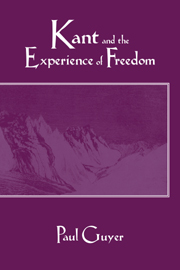Book contents
- Frontmatter
- Contents
- Preface
- Note on citations
- Introduction
- KANT'S AESTHETICS IN HISTORICAL CONTEXT
- KANT'S AESTHETICS AND MORALITY: TOPICAL STUDIES
- Chapter 6 The beautiful and the sublime
- Chapter 7 Nature, art, and autonomy
- Chapter 8 Genius and the canon of art: a second dialectic of aesthetic judgment
- Chapter 9 Duties regarding nature
- Chapter 10 Duty and inclination
- Notes
- Bibliography
- Index
Chapter 7 - Nature, art, and autonomy
Published online by Cambridge University Press: 05 March 2012
- Frontmatter
- Contents
- Preface
- Note on citations
- Introduction
- KANT'S AESTHETICS IN HISTORICAL CONTEXT
- KANT'S AESTHETICS AND MORALITY: TOPICAL STUDIES
- Chapter 6 The beautiful and the sublime
- Chapter 7 Nature, art, and autonomy
- Chapter 8 Genius and the canon of art: a second dialectic of aesthetic judgment
- Chapter 9 Duties regarding nature
- Chapter 10 Duty and inclination
- Notes
- Bibliography
- Index
Summary
Kant holds that pleasure in the beauty and the sublimity of nature has a moral value lacking in a taste for fine art. To the modern sensibility, irremediably transformed by the modern conception of the uniqueness of artistic creation, this must appear antiquated, as irrelevant to our own conception of the self and its expression in art as powdered wigs to our dress. For us, indeed, when artists reshape nature into earthworks or drape whole islands in cloth, nature itself may seem like nothing more than another medium for art. But a careful comparison of Kant's reasons for preferring nature over art with views about nature and art common among his contemporaries reveals a distinctly modern sensibility after all. Although his conclusions may seem typical of his time, Kant's grounds for them are radically divergent from those his peers accepted: Kant glorifies the aesthetic appreciation of nature and downplays that of art precisely because he thinks that the former displays the fundamental autonomy of the human will far better than the latter. He would not reconceive of nature as itself a product of human artistry – art creates at best a second nature – but his own view that natural beauty and sublimity are so important just because they offer us a far greater opportunity to admire the magnificence of our own autonomy than any form of art is also a profound departure from his time.
- Type
- Chapter
- Information
- Kant and the Experience of FreedomEssays on Aesthetics and Morality, pp. 229 - 274Publisher: Cambridge University PressPrint publication year: 1993
- 19
- Cited by

